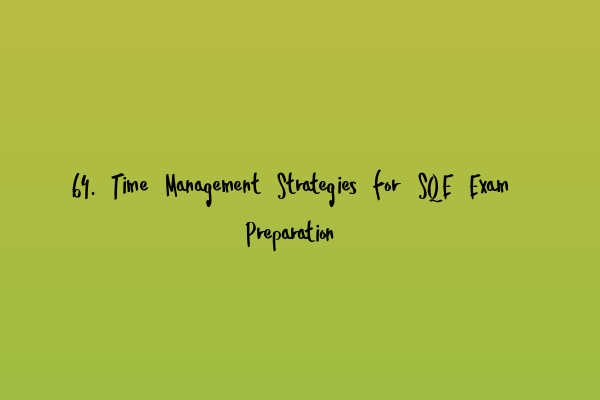64. Time Management Strategies for SQE Exam Preparation
Preparing for the SQE exams can be a daunting task. With numerous topics to cover and limited time available, effective time management is crucial to ensure success. In this article, we will explore 64 time management strategies that will help you make the most of your study time and optimize your preparation for the SQE exams.
1. Create a Study Schedule
One of the first steps in effective time management is to create a study schedule. Develop a weekly or monthly plan that outlines the topics you need to cover and allocate specific time slots for each subject. This will help you stay organized and ensure that you cover all the necessary material before the exams.
For more insights on understanding the grading system in SQE, check out our article 23. Understanding the Grading System in SQE.
2. Prioritize Your Subjects
Not all subjects carry equal weightage in the SQE exams. Prioritize your subjects based on their importance and difficulty level. Start with the subjects that you find most challenging or carry more weightage in the exams. By doing so, you can allocate more time and energy to these subjects and ensure a better understanding of the material.
3. Break Down Topics
Law is a vast subject, and it can be overwhelming to tackle large topics all at once. Break down complex topics into smaller, more manageable subtopics. This will not only make your study sessions more focused but also give you a sense of progress as you complete each subtopic.
4. Use Active Learning Techniques
Passively reading textbooks or notes may not yield the best results. Engage in active learning techniques such as problem-solving, group discussions, or teaching the material to someone else. Active learning enhances your understanding and retention of the subject matter.
5. Take Regular Breaks
Studying for long hours without breaks can lead to mental fatigue and reduced productivity. Take regular breaks, ideally every 45-60 minutes, to refresh your mind and maintain focus. Use these breaks to relax, stretch, or engage in a physical activity to rejuvenate your energy levels.
6. Avoid Procrastination
Procrastination is the enemy of effective time management. Recognize and resist the temptation to delay your study sessions. Set specific goals for each study session and hold yourself accountable. Breaking tasks into smaller, achievable goals can help overcome the urge to procrastinate.
To unlock more insights and expert knowledge through webinars, read our article 24. Unlocking Knowledge with SQE Webinars: Expert Insights at Your Fingertips.
7. Eliminate Distractions
Create a distraction-free study environment. Turn off notifications, put away your phone, and limit access to social media or other distractions. Find a quiet space where you can concentrate and immerse yourself in your study material.
8. Utilize Technology
Take advantage of technology to enhance your study experience. Use apps or software for note-taking, flashcards, or time management. Online resources or video tutorials can also be valuable aids in understanding difficult concepts or topics.
9. Practice Time-Bound Mock Tests
Getting familiar with the exam format and time constraints is essential. Incorporate timed mock tests into your study schedule to simulate exam conditions. This will help you improve your speed and accuracy in answering questions within the given timeframe.
For a comprehensive review of SQE course providers and choosing the best fit for your needs, read our article 17. Review of SQE Course Providers: Choosing the Best Fit.
10. Seek Support and Guidance
It’s essential to seek support and guidance as you prepare for the SQE exams. Form study groups, join online forums, or seek guidance from mentors or experienced professionals. Sharing ideas, discussing concepts, and clarifying doubts can be immensely helpful in your preparation.
11. Optimize Study Environment
Create a study environment that maximizes your concentration and focus. Find a well-lit and comfortable space with minimal distractions. Personalize your study area with motivational quotes or visuals to keep you inspired and motivated.
12. Take Care of Yourself
Remember to prioritize self-care during your preparation. Get sufficient sleep, eat a healthy diet, and exercise regularly. Taking care of your physical and mental well-being will enhance your cognitive abilities and overall productivity.
13. Review the SRA Syllabus
Make sure you have a clear understanding of the SRA (Solicitors Regulation Authority) syllabus for the SQE exams. Familiarize yourself with the specific topics and learning outcomes outlined by the SRA. This will help you focus your study efforts and ensure you cover all the necessary material.
For more information on the SRA syllabus, check out our article 4. Unveiling the SRA Syllabus for the SQE.
14. Make Use of Study Resources
Take advantage of the study resources available to you. Utilize textbooks, online articles, sample questions, and past exam papers to supplement your learning. The more resources you explore, the wider your knowledge base will be.
15. Stay Positive and Motivated
Preparation for the SQE exams can be challenging, but maintaining a positive mindset is crucial. Set realistic goals, celebrate small victories, and stay motivated throughout your study journey. Surround yourself with positive influences and visualize your success on exam day.
To uncover insider tips and study tricks for success in the SQE exams, read our article 31. Conquer the SQE: Insider Tips and Study Tricks for Success.
Conclusion
Effective time management is the key to success in SQE exam preparation. By creating a study schedule, prioritizing subjects, using active learning techniques, and eliminating distractions, you can optimize your study time and enhance your chances of achieving your desired results.
Remember, consistency and discipline are vital in implementing these time management strategies. Stay motivated, seek support when needed, and maintain a positive mindset throughout your preparation. Good luck!
